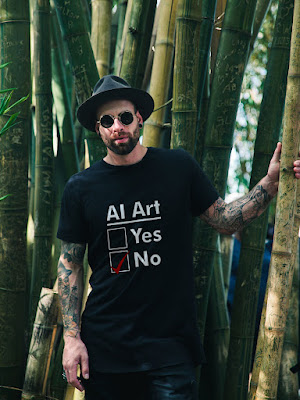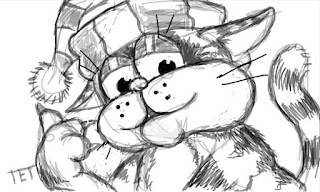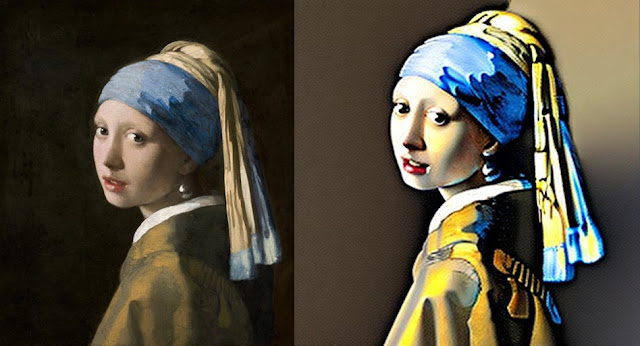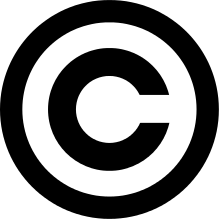 |
| AI Art No T-Shirt by TET Also available on other items. |
Right now there is a big debate over not just whether AI art is 'art' but whether AI's are actually ripping off the work of actual human artists, without their consent, to create their images - particularly images 'in the style of' specific artists.
From my own observations this debate started to get more traction when artist's signatures began appearing in the output of AI Art image generators.
Is It Art?
 |
| Cool Froyd the Cat Sketch by TET. My style is very much influenced by classic Disney and WB character styles. |
To get some clarity on how real human artists work (of which I am one)... we, that is all of us... take influences from the art that has come before. i.e. whatever artists we like, have studied, seen etc. we are influenced by. It shows up in our work, intentionally or not.
If you really study my own cartoony art style you'll see I'm heavily influenced by early Disney and Warner Bros cartoons more than Marvel or DC comics despite the fact I'm a tragic nerd for Superhero Comic Book movies.
Neither studio style was something I intentionally set out to emulate. It was only much later in life, reflecting on my work, that I saw the similarities. I really liked the 'roundness' of the way both studios would draw their characters. Superhero comics on the other hand are often quite angular drawing designs.
AI Art Image Generators do pretty much the same thing, just in a lot more of a direct approach. They don't collage together existing artworks but instead learn the common features of an art style and apply them to a new image.
The reason why you might see a specific artists signature show up is fairly obvious. If an artist always signs their work, as part of their work, in an obvious way, the AI is going to think the signature is part of the art style based on the images it has learned from. The AI doesn't know a signature from a brush stroke (which is possibly why their ability to include text in images has been poor but improving over time).
One could make the case and say if an AI reproduces a signature who's to say it doesn't reproduce other parts of artworks verbatim too? What is it Pablo Picasso said:
Good artists copy. Great artists steal.
You can test this out by entering the specific name of any famous, public domain artwork and its artist into an AI art generator. You'll see it doesn't just spit out an exact copy of the image but a very close approximation, depending on how much data it has learned. See my comparison with Vermeer's Girl with a Pearl Earing below.
 |
| Original Girl with a Pearl Earing Oil Painting by Johannes Vermeer (left) compared to output by Mage.space (AI) for the same artwork using the prompt "Girl with a Pearl Earring, oil painting by Johannes Vermeer". |
You can see the proportions in the AI Vermeer image are pretty spot on but the color is much more high contrast. Interestingly I tried adding 'in the style of Vermeer' to the end of my prompt and it didn't tone down the contrast at all.
However when your prompt is so specific to an actual artwork it makes sense that the AI would focus entirely on images of just that artwork and come up with something that could be a badly colored but traced copy of the original. The coloring is likely to be the result, in part, of different photos of the same image that don't share the same exposure for the colors.
All of this is AI art nonsense is reminiscent of the debate over whether photography is art, and then whether digital photography is real photography and/or art? Who is going to want to commission a painted portrait when they can just snap a photo? Yet we still have art prizes for painting portraits. We still have professional photographers despite anyone who owns a phone having a high quality camera to hand.
AI Art can coexist with real, human generated art. Sure, AI art is going to have some impact on the bottom line of professional, commercial artists in the same way photography did decades ago. There's going to be an adjustment period.
I didn't see a lot of real human artists complain when the Print On Demand market started competing with their wall space. Despite the fact you can literally make your own print of a famous master's artwork from the public domain and have it shipped to your house in seconds for less than the price of an original work of art direct from a current, living artist.
The argument over whether AI Art is 'art' is resoundingly 'yes it is'. The only question is subjectively whether you think it's good, bad, meh, or worth every penny some art collector might pay for it. (I mean if minimalists can call what they do 'art'... right?).
The fact that it takes a computer almost no time at all to create AI art is irrelevant. I guarantee you I can draw a picture of a cat (I'm known for painting cartoon cats) in under a minute that looks better than anything someone who can't draw cats could do in the same amount of time.
By this logic an AI that can make a breathtaking artwork of a cat in almost no time at all makes that work invaluable. (Noting that professional artists don't usually charge money for time because it penalizes those who can do amazing work in less time than it takes a less experienced artist to do mediocre work over many hours).
But That's Not Really the Issue. Copyright Is.
 |
| The Copyright Logo. |
In the previous section I talked about artist's signatures appearing in AI art and demonstrated that AI can spit out a copy of specific artworks if it has learned enough data about them. This direct approach to reinterpreting an artist's style through AI is stepping on artist copying rights and intellectual property.
That is, many of these A.I's are being provided with data from specific artists without the artists themselves knowing that their work is being used. Right at this moment anyone (corporations or you and I) with a bit of knowledge can install and train an AI on our own computers to produce artwork in the style of our favorite artist without asking the artist if this is okay or giving the artist any kind of financial compensation.
The problem being that once an AI has been trained with an image it can't be 'untrained'. Much like once you see an image you can't 'un-see' it. Which is more a problem in commercial AI image generators like DALL-E that are made available to almost anyone.
Things are not helped by the fact that you can literally ask for images in the style of specific artists. The closer the output is to that artist's style the higher the indication that the AI has been trained with that artist's artwork.
I can certainly sympathize with the copyright issue. Perhaps the people who train AIs need to be accountable to their source data? Maybe there needs to be some kind of licensing system in place. e.g. if a prompt specifically requests an artist's style the AI lets the user know that they'll need to make a royalty/license payment of some kind first before any images in that style can be used in commercial projects?
I don't know the answers here but there is a great video below by YouTuber and Artist, Sam Does Arts that describes these issues in more depth.
I'm obviously not anti AI art, and neither is Sam (as he says), but I find it hard to join this cause, as a professional artist. All the branding suggests there should be a total ban on AI Art but what's really being asked for is regulation and proper compensation to working artists.
Human Artists Will Adapt
The thing about humans is that we're excellent at adapting to anything new and different.
As AI art gets better I can see a day where human artists will train an AI on their own specific style for the purpose of producing new artworks in seconds.
Where do you stand on this idea if you are the artist who not only crafts the text prompt for the A.I but you're also the originator of the style the AI uses in its output of new images? How original is this art? Is it art? Are you more the author of the idea or is the AI?
At the end of the day AIs are just another type of artist in the sea of artists. They're not going away. They will capture a percentage of the market. There will be detractors and people who are incredulous that a machine could come up with art that good.
Human artists will adapt. Whether that's embracing the idea that an actual human created work is more valuable and desirable than AI or incorporating AI into their workflow to reveal new possibilities for creativity will depend on how you view this new technology.
The very fact that more and more artists are going fully digital means that physical, true one of a kind artworks are going to become a commodity even more than they are now. Why do you think NFT's took off for a moment there?
I feel there's still plenty of opportunity for artists resisting AI art to use its very existence to their advantage. At least as much opportunity as for those artists who wish to embrace AI art into their workflow.

Comments
Post a Comment
Comments are moderated by an actual human (me, TET) and may not publish right away. I do read all comments and only reject those not directly related to the post or are spam/scams (I'm looking at you Illuminati recruiters... I mean scammers. Stop commenting on my Illuminati post!).